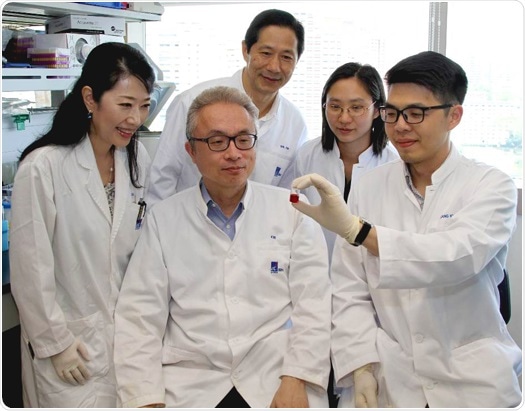Mar 16 2018
The Institute of Bioengineering and Nanotechnology (IBN) of A*STAR has reported superior results using new green tea-based nanocarriers to kill liver cancer cells, compared to existing drug delivery systems. IBN Team Leader and Principal Research Scientist, Dr Motoichi Kurisawa, and his group recently published their findings in the scientific journal Advanced Materials.

The research team at IBN that developed the green tea nanocarriers. Clockwise from right: Dr Kun Liang, Dr Motoichi Kurisawa, Dr Joo Eun Chung, Dr Shu Jun Gao and Dr Nunnarpas Yongvongsoontorn.
Researchers working on drug carrier technologies to improve cancer treatment face two key challenges. First, existing carriers used to transport drugs to tumor cells in the body can typically carry only about 10% of their weight in drugs. This means that more carriers are needed to deliver a specific amount of drugs, and patients would require more frequent injections or a larger dosage per treatment to kill cancer cells effectively.
Secondly, current carrier systems are unstable. As they move around in the body, they are easily diluted in the bloodstream or destabilized by plasma proteins. This leads to leakage of the drugs before the carrier reaches its intended target, thus harming healthy cells along the way to the tumor site. These shortcomings of current carrier systems result in less effective therapy and potential toxic side effects for the patients.
In 2014, IBN researchers led by Dr Kurisawa created self-assembling nanocarriers from epigallocatechin-3-O-gallate (EGCG), a known antioxidant found in green tea, and Herceptin, a breast cancer drug. Those nanocarriers could load and deliver more drugs to the cancer cells, and killed them more effectively than other formulations of the drug (Nature Nanotechnology, 2014). Now, the team has applied the same approach to make new nanocarriers from EGCG and Doxorubicin, which can carry up to 88% of their weight in drugs. Doxorubicin is used to treat a variety of different cancers, such as that of the breast, bladder and liver, as well as leukemia. IBN’s green tea-Doxorubicin nanocarriers were tested in a liver cancer mouse model and displayed superior tumor-killing performance and stability with minimal unwanted toxicity, when compared with two other clinical formulations of Doxorubicin.
“This study corroborates our earlier findings and demonstrates the versatility of our green tea-based carrier system. We are excited about the potential of using our technology as a universal vehicle for delivering other chemotherapeutics to treat different types of cancer,” said IBN Executive Director Professor Jackie Ying.
The uniqueness of IBN’s nanocarrier lies in the strong intermolecular interaction between the structurally similar EGCG and small molecule anti-cancer drugs. This interaction facilitates drug loading and also provides excellent thermodynamic and kinetic stability to the carrier.
According to Dr Kurisawa:
The unprecedented amount of drug loading in our new nanocarriers allows us to kill more liver cancer cells effectively. We are hopeful that our technology would lead to fewer side effects in patients.
The researchers are now evaluating the loading of other types of drugs in the carrier.